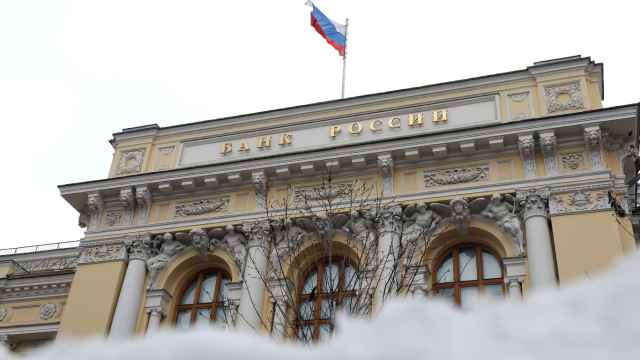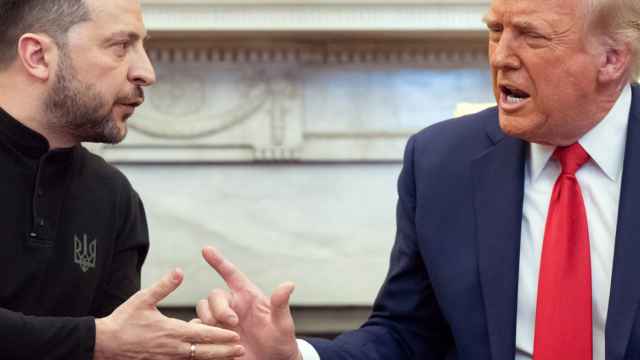The Russian authorities' handling of the attempted protest by Greenpeace at a Gazprom drilling rig in the Pechora Sea in mid-September once again reveals the reflexes that play into the hands of nongovernmental organization campaigners.
By charging the protestors on the preposterous grounds of "piracy", Russian officials have given Greenpeace a platform to attract attention that must wildly exceed the expectations of the protest's planners. Last week's launch of the Olympic torch relay in Moscow was overshadowed in the international media by reports of Greenpeace protests around the world in support of the "Arctic 30," currently detained in the northern city of Murmansk.
As a global advocacy organization with considerable public sympathy, Greenpeace is a formidable opponent. Many governments and major corporations around the world know this from bitter experience. A number have concluded that the best way to deal with NGOs of this kind is to talk and work with them, trying to make them part of the process of finding solutions to sensitive issues.
There is a good reason for this. The revolution in digital communications has given the campaigning NGOs enormous advantages. Large organizations, particularly governments, find it hard to respond rapidly and win head-to-head public relations battles with them.
The authorities' reaction to last year's Pussy Riot anti-Putin protest song at Christ the Savior Cathedral was the same. Instead of giving the perpetrators a rap over the knuckles, the various levels of the Russian system resorted to their default position of applying the maximum force of the law for fear of being seen as weak by those at the very top. The result was to establish a fringe group in Russia as a global brand. The high level of publicity around the trial of the three Pussy Riot defendants provided another vivid example to the world of the excesses of a politicized judicial system and presented Russia to an international audience as a nasty and dangerous place.
It is not hard to find other examples of public relations mishaps, such as the response to Hermitage Capital's highly effective PR campaign to achieve justice for its late lawyer Sergei Magnitsky or the authorities' reaction to Alexei Navalny's efforts in creating a political opposition movement. It is small wonder then that public attitudes towards Russia in many Western countries have become increasingly negative and that governments find it hard to ignore them. Germany is an interesting case in point: Since Putin's return to
the Kremlin, German media has become much more critical of Russia, and the government is conscious of the need to express its concern publicly about issues such as restrictions on NGOs and recent "anti-gay" legislation. Previously, the Germans would only raise these issues behind closed doors.
Why do Russia's leaders court PR disaster on such a regular basis? The easy answer is that they just do not care about Russia's international reputation. But the evidence points to the contrary. They want Russia to be seen as an important international player, a pole in its own right that attracts other Eurasian countries around it. The Russian government wants foreign investment that they know is essential for economic modernization. It wants support for Russia's determination to uphold the principle of sovereignty in international relations and prevent a unipolar world. They have established the 24/7 news channel RT as well as the agency Rossotrudnichestvo to promote Russia abroad. They also retain international PR advisers.
To be fair, Russia's leaders can sometimes communicate very effectively. President Vladimir Putin's intervention in the Syria crisis and his editorial in The New York Times were part of a diplomatic masterstroke that left U.S. President Barack Obama flat-footed. Putin also addressed leading foreign Russia-watchers from around the world at last month's Valdai Discussion Club . The event was a successful exercise in reaching an important target audience.
The Russian leadership's strategic understanding of global competition should mean that the priority of maintaining a positive international reputation is well understood. This is far from the case and Russian officials and businesspeople regularly complain about the anti-Russian bias of Western media. They are seemingly blind to two facts: Firstly, that Russia is poor at developing and delivering credible messages that engender support and, secondly, that it allows others to shape the narrative about the country.
Russia's leaders appear to be in denial about the way global media now work and how campaigning organizations such as Greenpeace make use of the opportunities they present. Digital communications and the demands of the 24/7 news cycle mean that entire narratives can be formed by those who respond fastest with the strongest image. Pussy Riot's colorful masked faces set the tone for foreign coverage of their antics, which portrayed them as participants in an unfair fight against the full might of the Russian state. In the case of the Greenpeace protest, the still shot of a Russian security official threatening an unarmed environmental activist with a knife has become the defining image of the protest and the disproportionate Russian response.
"Free the Arctic 30" is now an international campaign that will gather pace the longer the Greenpeace activists are held. In line with Greenpeace's objectives, public opinion across the world has been sensitized to the issue of developing resources in the Arctic. Russia's leaders probably think that this matters little and that environmental organizations can be discouraged through intimidation.
However, not just Russia's international image is suffering. Russia needs foreign partners to develop its Arctic resources. Some of the international oil companies that have entered preliminary agreements with Rosneft to look at these opportunities will be watching with concern. They will have no desire for a fight with Greenpeace or others, particularly if their partner's government continues to use tactics of this kind.
John Lough is a vice president with BGR Gabara Limited, a London-based international communications consultancy. He is also an associate fellow with the Russia & Eurasia Program at Chatham House.
A Message from The Moscow Times:
Dear readers,
We are facing unprecedented challenges. Russia's Prosecutor General's Office has designated The Moscow Times as an "undesirable" organization, criminalizing our work and putting our staff at risk of prosecution. This follows our earlier unjust labeling as a "foreign agent."
These actions are direct attempts to silence independent journalism in Russia. The authorities claim our work "discredits the decisions of the Russian leadership." We see things differently: we strive to provide accurate, unbiased reporting on Russia.
We, the journalists of The Moscow Times, refuse to be silenced. But to continue our work, we need your help.
Your support, no matter how small, makes a world of difference. If you can, please support us monthly starting from just $2. It's quick to set up, and every contribution makes a significant impact.
By supporting The Moscow Times, you're defending open, independent journalism in the face of repression. Thank you for standing with us.
Remind me later.







